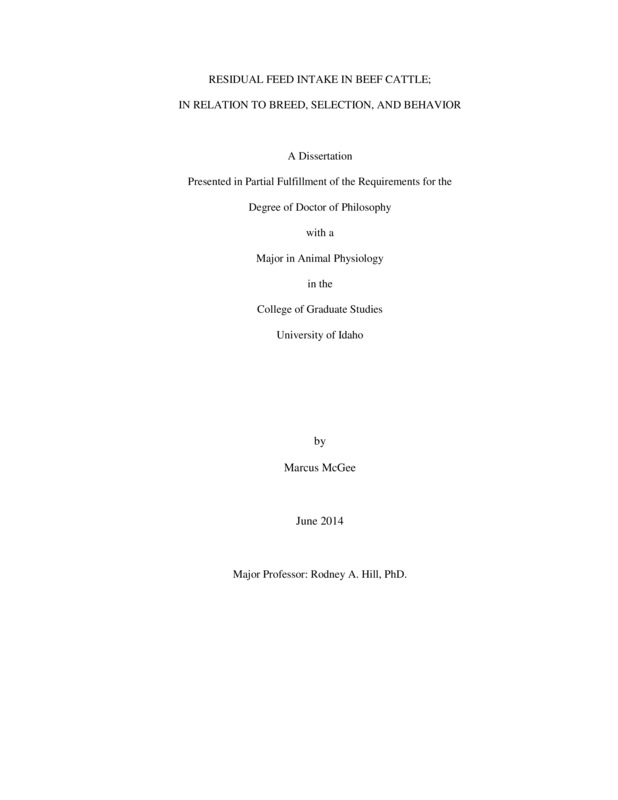RESIDUAL FEED INTAKE IN BEEF CATTLE; IN RELATION TO BREED, SELECTION, AND BEHAVIOR
McGee, Marcus. (2014). RESIDUAL FEED INTAKE IN BEEF CATTLE; IN RELATION TO BREED, SELECTION, AND BEHAVIOR. Theses and Dissertations Collection, University of Idaho Library Digital Collections. https://www.lib.uidaho.edu/digital/etd/items/mcgee_idaho_0089e_10366.html
- Title:
- RESIDUAL FEED INTAKE IN BEEF CATTLE; IN RELATION TO BREED, SELECTION, AND BEHAVIOR
- Author:
- McGee, Marcus
- Date:
- 2014
- Keywords:
- Feeding behavior Residual feed intake Wagyu
- Program:
- Animal and Veterinary Science
- Subject Category:
- Animal sciences; Animal behavior
- Abstract:
-
Feed efficiency is a necessary factor in beef production systems due to rising feed ingredient costs, population growth, and beef supply demands. With this known, it is important for researchers to delve into mechanisms involved in efficiency to provide producers with a knowledge base for future selection and breeding programs. Though the use of residual feed intake (RFI) is fairly well know, traditional traits are often considered more desirable due to costs associated with testing. However, previous research has provided evidence of benefits using a less biased measurement (RFI) in comparison with its counterparts (e.g. ADG, FCR, F:G etc...) Though RFI does provide indication of efficiency status, there are underlying mechanisms that also play a role in these measurements that are not completely understood. One attribute of efficiency often overlooked is feeding behavior, in which this body of work attempts to interpret via relationships with RFI. Previous research has provided has examined relationships between these two parameters, however further studies are necessary to gain a more solid foundation. Research within this dissertation will add to this knowledge base using two breeds of cattle examined for behavior traits (bunk visit frequency, bunk visit duration, feed bout frequency, feed bout duration, meal frequency, meal duration, and average meal intake) during the course of RFI evaluation. Niche breeds of beef cattle (e.g. Japanese Black Cattle) are often excluded from feed efficiency examinations, due to focuses of output, carcass quality traits, and increased specialty market value. However, the recent rise of feed ingredient costs are universal, and producers of niche breeds may benefit as well. Within this body of work, 3 cohorts of Wagyu cattle were evaluated for feeding behavior parameters with some insight towards relationships with efficiency. Red Angus cattle were also evaluated over both growing and finishing phase RFI to clarify feeding behaviors' role in efficiency. Results from these studies provide researchers with additional tools for elucidating these relationships as well as identifying specific feeding behaviors that contribute to efficiency status in beef cattle.
- Description:
- doctoral, Ph.D., Animal and Veterinary Science -- University of Idaho - College of Graduate Studies, 2014
- Major Professor:
- Hill, Rodney A
- Committee:
- Watson, Phillp; Murdoch, Gordon; Hall, John
- Defense Date:
- 2014
- Identifier:
- McGee_idaho_0089E_10366
- Type:
- Text
- Format Original:
- Format:
- application/pdf
- Rights:
- In Copyright - Educational Use Permitted. For more information, please contact University of Idaho Library Special Collections and Archives Department at libspec@uidaho.edu.
- Standardized Rights:
- http://rightsstatements.org/vocab/InC-EDU/1.0/

